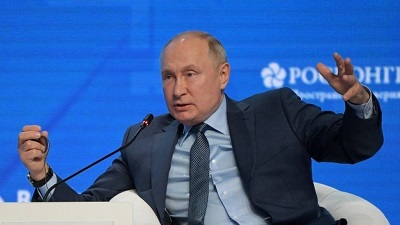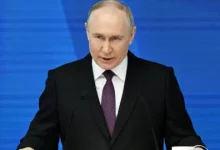
Russia has denied using energy as a political weapon, amid surging prices across Europe that have sent gas bills in many households skyrocketing.
President Vladimir Putin said such claims were “complete rubbish… and politically motivated tittle-tattle”.
Russia, one of Europe’s biggest natural gas providers, has been accused of intentionally withholding supplies.
The European Commission has been outlining measures member states can take to combat rising prices.
The wholesale price of gas has increased by 250 per cent since January, triggering a knock-on spike in costs for consumers and businesses.
Energy prices have hit record highs for various reasons, including high demand for natural gas as economies recover from the COVID-19 pandemic.
Speaking at a Moscow energy forum on Wednesday, President Putin blamed the current crisis on Europe, saying that after a cold winter Europeans had not pumped sufficient volumes of gas into storage facilities.
He said it was “very important” to “suggest a long-term mechanism to stabilise the energy market”.
Mr Putin stressed that Gazprom, Russia’s gas giant, was supplying gas to Europe at maximum levels under existing contracts, and was ready to provide more if requested.
“We will increase by as much as our partners ask us. There is no refusal, none,” he said.
Critics have accused Russia of squeezing supplies for political motives, partly to put pressure on Germany to speed up the approval of the completed Nord Stream 2 pipeline, which bypasses Ukraine – a key gas-transporter to the European Union (EU).
Opponents say the undersea pipeline in the Baltic is a political project and could make Europe more dependent on Russian energy.
But Mr Putin said it would ease Europe’s gas crisis.
Earlier on Wednesday, the European Commission’s energy chief, Kadri Simson, said the EU’s executive was responding to calls for urgent action by unveiling an “energy price toolbox”.
The toolbox outlines steps member states can take to reduce energy bills in their countries without breaching EU law. It mostly confirms the measures national governments can already use, but considers what more the Commission can do.
Ms. Simson said member states were best placed to ease the burden of rising energy prices as winter approaches.
She urged them to consider emergency income support for vulnerable households, state aid for companies, and targeted tax reductions. -BBC




